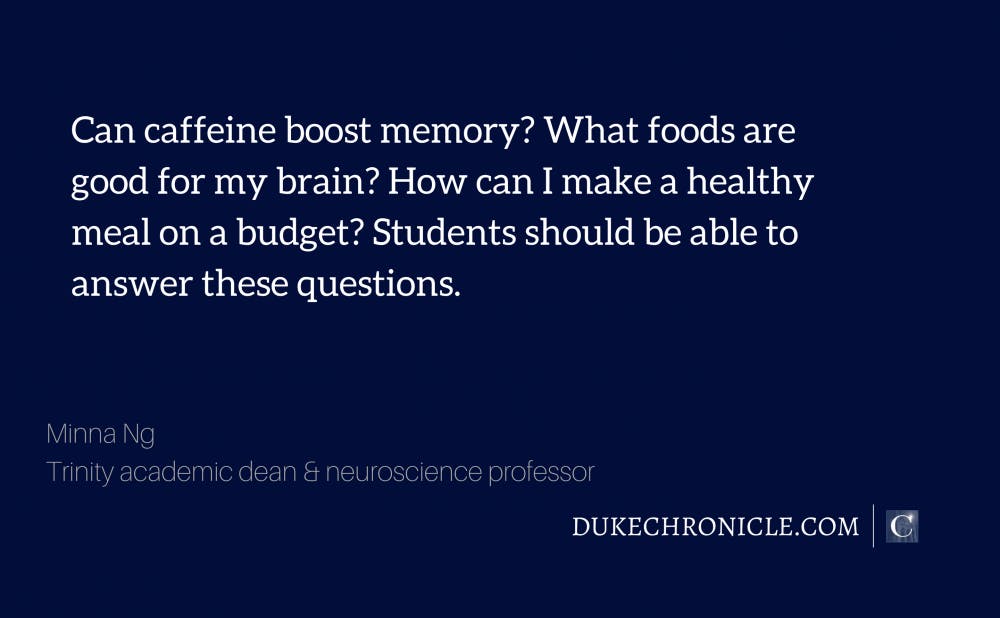“I’m having trouble with your class. I swear I’m trying.” a student pleads to me in my office.
I ask about time management or study strategies: “Do you schedule study time? How do you take notes?” I also offer motivational words: “Hang in there. Don’t be discouraged. You can do it.” And as I am saying this, I cannot ignore the Big Gulp soda he has in one hand and the greasy fast food bag in the other.
I don’t say anything, but I am worried about how he is feeding his body and mind. Better note-taking skills may not be the right answer.
I don’t ask “Do you know what research says about food and academic performance? Did you read the nutrition labels?” My office is not the right place to talk about this. But if he were taking Neuroscience & Nutrition, a new course created by me and Franca Alphin, the director of nutrition services at Duke and a registered dietitian, I could tell him how his eating habits are affecting not only his body, but also his mind.
Can caffeine boost memory? What foods are good for my brain? How can I make a healthy meal on a budget? Students should be able to answer these questions, assess nutritional content and analyze ingredient labels as they experience their first autonomy in college. If they were armed with these skills, they could boost their overall wellness and improve their academic success.
I have taught students in community colleges, public and private universities. Some worked full-time or part-time in addition to school. Some took public transportation, drove to campus, or lived on campus. Some were below the poverty line, others in the top 1 percent.
Regardless of these differences, all campuses seem to have that popular vending machine selling Doritos. Fancier machines even hold a variety of flavors, like Cool Ranch and Supreme Cheddar. Their convenience and cost are packaged as a perfect midnight study snack.
Just like tests and the importance of grades, poor food choices, on and off college campuses, will not go away.
I’m now at a campus with a cafeteria largely attended by freshmen. It is a buffet, every day. If your family taught you to pile on the food with little or no concern about nutritional value, you will likely do the same on campus. You will also go back for more if you were taught that eating more meant getting your money’s worth. For much of my life, this is what I did because it was what I was taught at home.
But in college, we have an opportunity to teach our students to make informed choices. Their choices in books, movies, friends and career paths are influenced by what we teach. And we can do the same with nutrition. The best place to do this? In the classroom. And the earlier the better.
According to American College Health Association, only 4.6 percent of students ate the recommended servings of fruits and vegetables. These students had 0.15 points higher GPAs. Students who drink soda believe that they are doing worse in school. Yet nearly 60 percent drink at least 1 sugary beverage a day, and 20 percent of college graduates are obese.
We can do better. We can limit the availability of soda fountains. Duke’s new Brodhead Center dining hall substituted them with water stations. Students can choose from iced water infused with lemon, cucumber or mint. This range of tasty options is visually appealing, and students refill as often as they want.
We can also add ingredient lists and nutrition labels to our foods to track intake. This could help reduce the obesity rate among college students. They can look out for specific vitamins like iron. Too much or too little has negative impacts on learning. And to promote brain health, they can seek foods with DHA (docosahexaenoic acid), an omega-3 fatty acid.
Wellness has become a popular topic on campuses across the country and colleges are investing resources to encourage healthy student behaviors. To make a lasting change in students’ lives, perhaps a class in nutrition should be required as a part of the core college curriculum, right alongside writing and math. Our students can actively nourish their bodies and minds as soon as they enter that all-you-can eat cafeteria. They can choose foods to support their academic success. Regardless of their majors, knowing how to nourish their bodies and minds have a guaranteed payoff.
Minna Ng is a neuroscience professor, Trinity academic dean and the faculty director for the David M. Rubenstein Scholars program.
Get The Chronicle straight to your inbox
Signup for our weekly newsletter. Cancel at any time.

